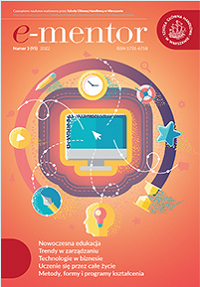Strategie indywidualnego uczenia się i inne charakterystyki studiowania w pierwszej fazie zdalnego nauczania podczas pandemii COVID-19
Individual learning strategies and other characteristics of e-learning in the first phase of online learning during the COVID-19 pandemic
Author(s): Katarzyna SmoterSubject(s): Education
Published by: Szkoła Główna Handlowa w Warszawie, Fundacja Promocji i Akredytacji Kierunków Ekonomicznych
Keywords: learning strategies; online studies; students; first phase; COVID-19 pandemic
Summary/Abstract: One aspect of university governance during the Covid - 19 pandemic was the introduction of compulsory distance learning. This set-up required significant modifications in the organisation of the teaching-learning process, becoming an area of reflection in the field of academic didactics. The main addressees of the described educational change were female and male students - entities who chose different paths to achieve their learning goals. The analysis subject of this article is to identify such characteristics as, inter alia, their learning strategies, ways of evaluating online classes or emotions experienced in a learning situation. The pilot studies were carried out in the first phase of introducing remote university teaching, and were done using a unique questionnaire. The theoretical basis of the research was the learning theory of adults, described by M. Knowles, co-creators of the teaching-learning process, selecting methods of action to specific problems. In this article we refer to the description of the strategy (individual learning) according to R. Arends (1998), as well as other issues related to remote university learning, i.e. evaluation of one's own study process, satisfaction with studying and emotions evoked by the necessity to learn remotely. Referring to the research results, the most frequently chosen strategies were those around working with 'written text': highlighting the most important information, creating notes or adding comments in the text. On the other hand, online classes were often of low value for the students. The obtained results also indicate the predominance of negative feelings and states related to anxiety, anger or disappointment with the remote organisation of university work.
Journal: e-mentor
- Issue Year: 95/2022
- Issue No: 3
- Page Range: 4-12
- Page Count: 9
- Language: Polish

